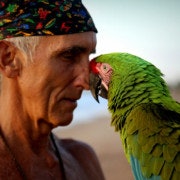 Dr. Don Trent Jacobs “Four Arrows” is an author and professor at Fielding Graduate University.
Dr. Don Trent Jacobs “Four Arrows” is an author and professor at Fielding Graduate University.When it comes to promoting education, Dr. Don Trent Jacobs — most commonly known as “Four Arrows” — favors unconventional pedagogical approaches to teaching and learning.
For several decades now, Four Arrows has carved out a distinguished career as a writer and professor known for championing the rights of Native Americans. He has also used his prominence to call attention to the plight of indigenous peoples in the United States and around the world.
“I really believe that the dominant culture and the dominant worldview approach to education is largely hegemonic,” says Four Arrows, who lives in a small Mexico fishing town about three hours from Puerto Vallarta. “It’s way past time for us to find new ways to prepare people for the next seven generations. We can do this when we just let go [of] the hegemonic views of the world.”
With Cherokee, Muscogee (Creek) and Scots-Irish ancestry, Four Arrows’ mother steered clear of teaching her children about their Native American heritage, largely because she wanted to protect them from widespread discrimination directed against Native Americans, he relates.
But after a stint in the Marine Corps, Four Arrows went in search of his heritage and forged a connection with the indigenous Native Americans, even taking up sun dancing.
After spending several years in various jobs, including public school teacher and lecturer, and earning a Ph.D. from Columbia Pacific University, Four Arrows enrolled at Boise State University.
There he earned an Ed.D. in curriculum and instruction with a focus on the indigenous populations in the United States and the world.
A prolific author who has penned a multitude of books, chapters and essays, Four Arrows accepted the deanship of the School of Education at Oglala Lakota College on the Pine Ridge Indian Reservation in South Dakota. Shortly after he arrived, the school had lost its accreditation. Under his leadership, though, within 18 months its accreditation was fully restored, he says.
“That was my first real exposure of the problems and beauty of indigenous people struggling to survive,” says Four Arrows, who lived on the reservation with his wife and rode a horse to work.
He stayed at the tribal college for three years, but was eventually convinced to work at Northern Arizona University (NAU), where he was appointed to a tenured associate professorship in instructional leadership. However, he says that, at NAU, he increasingly grew disenchanted by the trajectory of traditional higher education programs.
He also felt that the university, which is located on former Native lands, did not do enough to support the Native peoples.
“There is so much emphasis on neoliberalism and capitalism,” he says of the current state of higher education. “We were training people to get jobs in the same system that was causing the problems. How is education helping?”
Looking for a new challenge, Four Arrows made the unusual decision to leave his tenured position at NAU behind and accept a contract in the College of Educational Leadership and Change at Fielding Graduate University, which he says focuses on “making social ecological justice and wellness in the world a priority.”
“Very few people have tenured professorships,” says Four Arrows, who stays busy directing doctoral dissertations on issues that largely focus on social justice issues. When he is not teaching, he is traversing the world giving lectures. “ … But people tend to get promoted because they follow a certain line. I believe that we can begin to move beyond the status quo.”
Fielding Graduate University, which offers distance education and is headquartered in Santa Barbara, California, graduates one of the largest cohorts of Native American doctoral students, according to university officials. Fielding Graduate University also draws students from across the globe and is focused on adult learners.
In the 1990s, Four Arrows made the decision to adopt his tribal name. But that change did not come easy. He only began publishing under Four Arrows in the early 2000s.
“I had a difficult time getting published,” he says, adding that, as a person of mixed-blood heritage, he faced “ridicule on both sides.”
As Four Arrows adds, “It wasn’t the easiest thing to do, but I just decided that I was going to be bold.”















